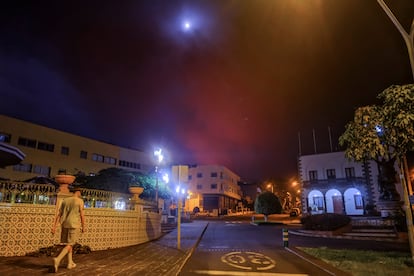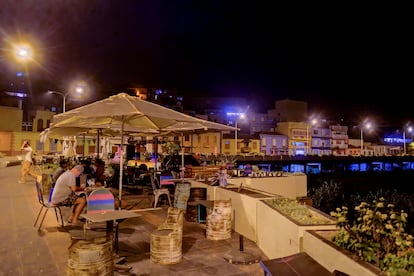As new lava stream nears the sea, La Palma residents try to stay a step ahead
Parts of Tazacorte will go into home confinement when the molten rock reaches the Atlantic Ocean, and some people are choosing to get out before that happens


“What shall we take?”
“We’ll take everything.”
Encarni is nervous. Three of her nephews have just arrived with two pick-up trucks at the door of her house in San Borondón, the southernmost residential area in the municipality of Tazacorte, on the Spanish island of La Palma, where a volcano has been erupting since September 19.
The authorities have not ordered the area to evacuate, although they did warn that when the lava tongue reaches the ocean, a lockdown will be declared in four of the seven neighborhoods in the municipality to avoid the possible inhalation of dangerous gases such as carbon dioxide. Yesterday the molten rock was 30 meters from the shore and was traveling at a speed of between five and 10 meters per hour, according to the Volcanology Institute of the Canaries (Involcan), which is monitoring the eruption in this part of the Canary Islands, a Spanish archipelago off the northwest coast of Africa.
Encarni’s house, which has two floors and is next to the only restaurant in the area, is just 500 meters from the exclusion zone closest to the coast. “We’ll take it all because the lava is going to arrive,” says her husband, Juan, who is showing the youngsters how to load the boxes of crockery onto the pick-up trucks.
The couple has another house further north, in Punta Gorda, which they will use for storage. “They haven’t told us anything, but you can smell it already… Pull up your mask,” says Encarni to one of her nephews, amid a constant shower of ash.
The residents of Tazacorte are afraid. The tensions that have been ongoing during the month since this new volcano began to erupt are seeing people trying to stay a step ahead of the destructive forces of the lava. They have seen relatives and friends forced to empty their houses in record time, and they don’t want to be next. They are worried that the lava flow that branched off from the Callejón de la Gata industrial park in Los Llanos de Aridane and that is still moving toward the center of La Laguna could end up coming to their area, which is just three kilometers away.
On Saturday, the authorities called together the residents of Tazacorte, which is home to around 3,000 people, to give them information. At the meeting in the municipal sports center they handed over a leaflet with the different emergency scenarios and all of the steps that must be followed should there be a lockdown or an evacuation. That chat, which lasted more than two hours and allowed them to voice any doubts via a microphone, left the people even more concerned, as many who spoke that day have explained.

“All I know is that I don’t know anything,” said one of the residents, after confirming that the meeting had only served to increase his nerves. “Can you assure us that we can sleep in peace?” one woman asked, in reference to the almost daily earth tremors. Rubén Fernández, the technical director of the Pevolca team of experts monitoring the phenomenon, repeated a number of times that the behavior of a volcano is unpredictable, and that any forecast of the direction in which the lava would move would be imprudent and without any scientific basis.
In the center of the city, which is another of the areas that could end up locked down in the coming hours, Francisco Camacho is discussing with one of his employees the route that the lava could take. Camacho, who owns the Kiosko San Miguel café in the main square, says that he is not concerned about having to shut himself in his home, nor close his business. What’s keeping him awake at night is the possibility that the whole town could be buried under the lava.
“We’ve just come out of a pandemic and we managed to survive,” he says. “The only thing I want now is for this all to stop.” He opened up his café on Tuesday knowing that he wouldn’t do much business. “Would you come and have a coffee with this ash?” says the waiter, as he overturns a table and watches a fine layer of ash fall to the ground.
When the lava tongue, which has a temperature of around 1,000ºC, reaches the sea, there will be an explosion of steam that will generate a dense white cloud. The resulting chemical reaction, mostly emitting chlorine, can irritate your skin, eyes and respiratory tracts. Yaira, 17, and Thalia, 16, are well aware of this. They are high school students and they have traveled to Tazacorte from Punta Gorda, as they do every Tuesday, for their math class.
“If they lock us down, on Friday we won’t come,” one of them explains. “We don’t want to breathe those substances.” They are also aware that the only victim of the Teneguía volcano on La Palma in 1971 died after inhaling these toxic gases.
In a nearby bar called La Arepera, two friends are having a coffee and chatting. They move around the city with high-grade FFP2 masks on, and say that spending more time at home does not concern them. “I’m going to carry on doing the same things,” says Nieves, 47, who works in hospitality and is thinking about moving to Tenerife because she believes that the situation is becoming “impossible.”
Her colleague Aymara, 44, lives in La Laguna and was evacuated from her home. She is living in a house someone has loaned her in Tazacorte. “Honestly, I don’t care about the ash, the gases – Covid was much better than this, at least you were in your home,” she complains. Nieves takes a sip of her coffee. “This volcano is bad. Very bad.”
Tu suscripción se está usando en otro dispositivo
¿Quieres añadir otro usuario a tu suscripción?
Si continúas leyendo en este dispositivo, no se podrá leer en el otro.
FlechaTu suscripción se está usando en otro dispositivo y solo puedes acceder a EL PAÍS desde un dispositivo a la vez.
Si quieres compartir tu cuenta, cambia tu suscripción a la modalidad Premium, así podrás añadir otro usuario. Cada uno accederá con su propia cuenta de email, lo que os permitirá personalizar vuestra experiencia en EL PAÍS.
¿Tienes una suscripción de empresa? Accede aquí para contratar más cuentas.
En el caso de no saber quién está usando tu cuenta, te recomendamos cambiar tu contraseña aquí.
Si decides continuar compartiendo tu cuenta, este mensaje se mostrará en tu dispositivo y en el de la otra persona que está usando tu cuenta de forma indefinida, afectando a tu experiencia de lectura. Puedes consultar aquí los términos y condiciones de la suscripción digital.








































